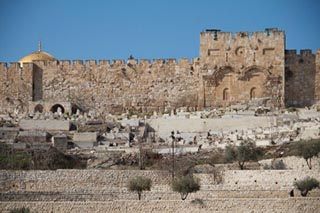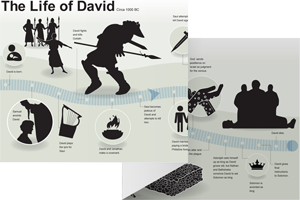14:1 The narrative here shifts its focus back to the kingdom of Judah. Like 13:9–13, this verse can be confusing, because the Hebrew text here calls a king of Judah and a king of Israel by the same name, yo’ash (Joash). Amaziah king of Judah’s father is not the same person as the king of Israel who goes by the same name (who is the son of Jehoahaz); Amaziah’s father is the son of Ahaziah. See note on 13:9–13. |
the second year of Jehoash Amaziah reigned in Judah alone from about 796–792 bc. He shared the throne with his son, Uzziah, for the final 25 years of his reign (see note on 2 Chr 26:3).
Northern King | Date | Southern King | Date |
Jehoash | 798–786 bc | Joash | 835–796 bc |
Jeroboam II | 786–747 bc | Amaziah | 796–767 bc |
Zechariah | 747–746 bc | Uzziah (Azariah) | 792–742 bc |
14:2 Jerusalem The capital of the kingdom of Judah.
14:3 not as David his ancestor David was the standard for good, kingly behavior because of his desire to live a worshipful, Yahweh honoring life (1 Kgs 3:6; 9:4; 11:4).
as all that Jehoash his father had done, he did Although Joash, king of Judah, is described as doing right in the eyes of Yahweh, the text also notes that he failed to take down the high places where people made unsanctioned offerings (2 Kings 12:2–3).
14:4 the high places Unsanctioned places of worship.
14:5 who had killed his father the king Jozacar, son of Shimeath, and Jehozabad, son of Shomer, killed King Joash of Judah in the house of Millo. See 12:20–21.
14:6 the scroll of the law of Moses See note on 1 Kgs 2:3.
because of his own sin See Deut 24:16 and note. In the ancient Near East, the practice of killing a person’s entire household in revenge was common, particularly if a royal throne was at stake (Judg 9:3–6; compare 2 Kgs 10; note on 9:1–13).
14:7 He also killed ten thousand Edomites This battle is covered in greater detail in 2 Chr 25:5–12.
the Valley of Salt The site of earlier battles with the Edomites in the time of David (2 Sam 8:13; Psa 60:title).
Sela The precise location of Sela is uncertain, but the book of Judges locates it on the border of Amorite territory (Judg 1:36). Balaam mentions this site in his prophecy against the Kenites (Num 24:21).
14:8 Jehoash To distinguish the king of Israel from Amaziah’s father who shared the same name, the Hebrew text here refers to the king of Israel as yeho’ash (Jehoash). The last time he was mentioned, he was referred to in the Hebrew text as yo’ash (Joash; 2 Kings 14:1). Yeho’ash (Jehoash) is an alternate spelling of yo’ash (Joash). The king of Israel is referred to as yeho’ash (Jehoash) until v. 23.
let us meet face-to-face From the wording of the Hebrew text, it is unclear whether Amaziah’s invitation is meant to be a threat, but Jehoash’s response seems to indicate that he understood it as one (vv. 9–10).
14:9 Amaziah’s statement in 2 Kgs 14:8 appears to be calling Jehoash to meet in battle (compare 23:29). To answer, Jehoash uses a nature parable. In the parable, Jehoash is the cedar; Amaziah is the thistle (or thornbush). The thistle was a thorny plant that grew wild on unattended properties (Job 31:40; Isa 34:13; Hos 9:6). The symbolism is meant to warn Amaziah against arrogance. Despite his recent victory, Amaziah (king of Judah) should not presume to set himself on the same level as Jehoash, king of Israel. The thistle’s request for a wife might imply that Amaziah asked for an Israelite princess as a wife, or it could simply serve to illustrate a presumptuous request. |
cedar which is in Lebanon Cedar wood from Lebanon was famous from as early as the third millennium bc.
14:11 would not listen This seems to imply that Amaziah, king of Judah, continued to threaten Jehoash, king of Israel, and perhaps even brought armed forces against Israel.
Beth-Shemesh which belongs to Judah This clarification is given because there were several places called Beth-shemesh (Josh 19:22, 38; Judg 1:33; 1 Kgs 4:9).
14:13 the son of Jehoash The Hebrew text here refers to Amaziah’s father using the alternate spelling of his name yeho’ash (Jehoash). Compare note on 2 Kings 13:9–13.
the Gate of Ephraim up to the Corner Gate The Ephraim Gate is on the north side of Jerusalem; the Corner Gate is most likely on the western side of Jerusalem.
14:14 to Samaria The capital of the northern kingdom of Israel. See note on 1:3.
14:15 the events of the days of the kings of Israel See note on 1:18.
14:16–17 Here, the Hebrew text clearly distinguishes between the king of Judah and the king of Israel who shared the same name, by spelling the king of Israel’s name yeho’ash (Jehoash) and the king of Judah’s name yo’ash (Joash). See note on v. 8; compare note on 13:9–13. |
14:16 slept with his ancestors See note on 8:24.
14:18 the events of the days of the kings of See note on 1:18.
14:19 They conspired The text does not note who murdered Amaziah, but presumably it was people from within his own government.
to Lachish A city in the Judaean hill country (Josh 15:39).
14:21 Azariah The narrative about this king of Judah, who is also called Uzziah (2 Chr 26:1) continues at 2 Kgs 15:1.
14:22 Elath A site on the northern coast of the Gulf of Aqaba; associated with Ezion-geber, one of Solomon’s sea ports (1 Kgs 9:26). Rebuilding Elath would have required defeating the Edomites.
slept with his ancestors See note on 2 Kings 8:24.
14:23 The narrative about Azariah, king of Judah, is interrupted, as the narrator focuses on events that chronologically took place earlier. The narrator tells the story of Jeroboam II, king of Israel, who reigned ca. 786–746 bc. The Hebrew text here can be confusing, since both a king of Israel and a king of Judah are referred to as yo’ash (Joash). However, they are two distinct people. For this reason, some translations refer to the king of Israel as Jehoash, which is based on an alternate spelling. Compare note on 13:9–13. |
14:24 the sins of Jeroboam Refers to the idolatrous and syncretistic worship of the much earlier king of Israel, Jeroboam I (who reigned ca. 930–909 bc). See note on 3:3.
14:25 the sea of the Arabah The Hebrew text refers here to the Arabah, the arid valley that runs from the Sea of Galilee to the Gulf of Aqaba and includes the Dead Sea.
Jonah the son of Amittai the prophet See Jonah 1:1 and note. Apart from the book of Jonah, this is the only ot reference to the prophet Jonah.
Gath-Hepher A town on the border of the tribe of Zebulun’s territory (Josh 19:13).
14:27 blot out the name of Israel This Hebrew phrase occurs only here and in Deut 9:14; 29:20. It denotes “blotting out” or “erasing” and calls to mind the image of washing a scroll in order to reuse it. This particular reference could refer to Yahweh’s promise to Jehu in 2 Kgs 10:30, since the point of the narrative seems to be that Yahweh is getting tired of Israel’s sin. A similar phrase—“blot me out of your book”—occurs in Exodus (see Exod 32:32 and note).
Jehoash The Hebrew text here, when referring to this king of Israel, uses the alternate spelling of yeho’ash (Jehoash), which is yo’ash (Joash). See note on 2 Kings 13:9–13
14:28 Damascus and Hamath This would have required a defeat of the nation of Aram (Syria), as Damascus was their capital and Hamath was in their territory at this time (compare 8:7).
the events of the days of the kings of Israel See note on 1:18.

|
About Faithlife Study BibleFaithlife Study Bible (FSB) is your guide to the ancient world of the Old and New Testaments, with study notes and articles that draw from a wide range of academic research. FSB helps you learn how to think about interpretation methods and issues so that you can gain a deeper understanding of the text. |
| Copyright |
Copyright 2012 Logos Bible Software. |
| Support Info | fsb |
 Loading…
Loading…




 (see
(see 

